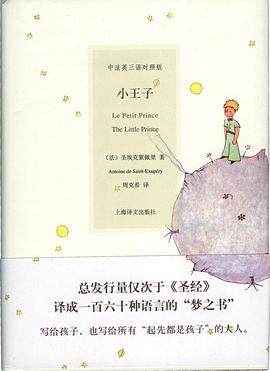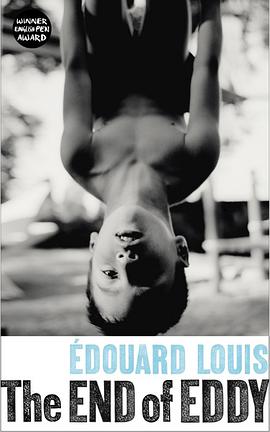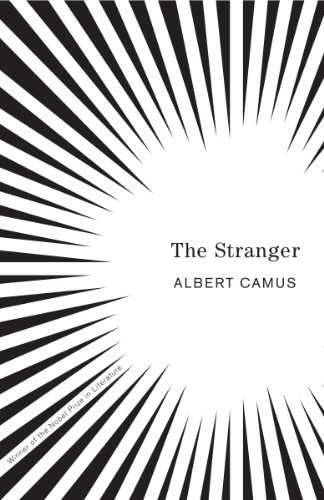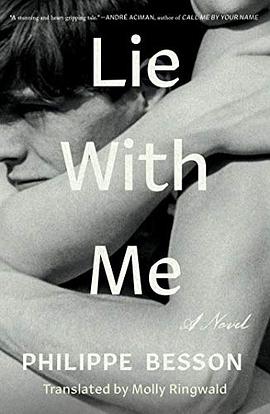法国文学
The End of Eddy 豆瓣
En finir avec Eddy Bellegueule
作者:
Edouard Louis
译者:
Michael Lucey
Harvill Secker
2017
- 2
Before I had a chance to rebel against the world of my childhood, that world rebelled against me. In truth, confronting my parents, my social class, its poverty, racism and brutality came second. From early on I provoked shame and even disgust from my family and others around me. The only option I had was to get away somehow. This book is an effort to understand all that.
Édouard Louis grew up in Hallencourt, a village in northern France where many live below the poverty line. His bestselling debut novel about life there, The End of Eddy, has sparked debate on social inequality, sexuality and violence.
It is an extraordinary portrait of escaping from an unbearable childhood, inspired by the author’s own. Written with an openness and compassionate intelligence, ultimately, it asks, how can we create our own freedom?
Édouard Louis grew up in Hallencourt, a village in northern France where many live below the poverty line. His bestselling debut novel about life there, The End of Eddy, has sparked debate on social inequality, sexuality and violence.
It is an extraordinary portrait of escaping from an unbearable childhood, inspired by the author’s own. Written with an openness and compassionate intelligence, ultimately, it asks, how can we create our own freedom?
The Stranger 豆瓣
9.6 (23 个评分)
作者:
Albert Camus
译者:
Matthew Ward
Vintage
1989
- 3
The Stranger is not merely one of the most widely read novels of the 20th century, but one of the books likely to outlive it. Written in 1946, Camus's compelling and troubling tale of a disaffected, apparently amoral young man has earned a durable popularity (and remains a staple of U.S. high school literature courses) in part because it reveals so vividly the anxieties of its time. Alienation, the fear of anonymity, spiritual doubt--all could have been given a purely modern inflection in the hands of a lesser talent than Camus, who won the Nobel Prize in 1957 and was noted for his existentialist aesthetic. The remarkable trick of The Stranger, however, is that it's not mired in period philosophy.
The plot is simple. A young Algerian, Meursault, afflicted with a sort of aimless inertia, becomes embroiled in the petty intrigues of a local pimp and, somewhat inexplicably, ends up killing a man. Once he's imprisoned and eventually brought to trial, his crime, it becomes apparent, is not so much the arguably defensible murder he has committed as it is his deficient character. The trial's proceedings are absurd, a parsing of incidental trivialities--that Meursault, for instance, seemed unmoved by his own mother's death and then attended a comic movie the evening after her funeral are two ostensibly damning facts--so that the eventual sentence the jury issues is both ridiculous and inevitable.
Meursault remains a cipher nearly to the story's end--dispassionate, clinical, disengaged from his own emotions. "She wanted to know if I loved her," he says of his girlfriend. "I answered the same way I had the last time, that it didn't mean anything but that I probably didn't." There's a latent ominousness in such observations, a sense that devotion is nothing more than self-delusion. It's undoubtedly true that Meursault exhibits an extreme of resignation; however, his confrontation with "the gentle indifference of the world" remains as compelling as it was when Camus first recounted it. --Ben Guterson
From Library Journal
The new translation of Camus's classic is a cultural event; the translation of Cocteau's diary is a literary event. Both translations are superb, but Ward's will affect a naturalized narrative, while Browner's will strengthen Cocteau's reemerging critical standing. Since 1946 untold thousands of American students have read a broadly interpretative, albeit beautifully crafted British Stranger . Such readers have closed Part I on "door of undoing" and Part II on "howls of execration." Now with the domestications pruned away from the text, students will be as close to the original as another language will allow: "door of unhappiness" and "cries of hate." Browner has no need to "write-over" another translation. With Cocteau's reputation chiefly as a cineaste until recently, he has been read in French or not at all. Further, the essay puts a translator under less pressure to normalize for readers' expectations. Both translations show the current trend to stay closer to the original. Marilyn Gaddis Rose, SUNY at Binghamton
Copyright 1988 Reed Business Information, Inc. --This text refers to the Hardcover edition.
Review
“The Stranger is a strikingly modern text and Matthew Ward’s translation will enable readers to appreciate why Camus’s stoical anti-hero and devious narrator remains one of the key expressions of a postwar Western malaise, and one of the cleverest exponents of a literature of ambiguity.” –from the Introduction by Peter Dunwoodie
From the Hardcover edition.
Description
Through the story of an ordinary man unwittingly drawn into a senseless murder on an Algerian beach, Camus explored what he termed "the nakedness of man faced with the absurd." First published in 1946; now in a new translation by Matthew Ward.
Language Notes
Text: English (translation)
Original Language: French
From the Inside Flap
Through the story of an ordinary man unwittingly drawn into a senseless murder on an Algerian beach, Camus explored what he termed "the nakedness of man faced with the absurd." First published in 1946; now in a new translation by Matthew Ward.
The plot is simple. A young Algerian, Meursault, afflicted with a sort of aimless inertia, becomes embroiled in the petty intrigues of a local pimp and, somewhat inexplicably, ends up killing a man. Once he's imprisoned and eventually brought to trial, his crime, it becomes apparent, is not so much the arguably defensible murder he has committed as it is his deficient character. The trial's proceedings are absurd, a parsing of incidental trivialities--that Meursault, for instance, seemed unmoved by his own mother's death and then attended a comic movie the evening after her funeral are two ostensibly damning facts--so that the eventual sentence the jury issues is both ridiculous and inevitable.
Meursault remains a cipher nearly to the story's end--dispassionate, clinical, disengaged from his own emotions. "She wanted to know if I loved her," he says of his girlfriend. "I answered the same way I had the last time, that it didn't mean anything but that I probably didn't." There's a latent ominousness in such observations, a sense that devotion is nothing more than self-delusion. It's undoubtedly true that Meursault exhibits an extreme of resignation; however, his confrontation with "the gentle indifference of the world" remains as compelling as it was when Camus first recounted it. --Ben Guterson
From Library Journal
The new translation of Camus's classic is a cultural event; the translation of Cocteau's diary is a literary event. Both translations are superb, but Ward's will affect a naturalized narrative, while Browner's will strengthen Cocteau's reemerging critical standing. Since 1946 untold thousands of American students have read a broadly interpretative, albeit beautifully crafted British Stranger . Such readers have closed Part I on "door of undoing" and Part II on "howls of execration." Now with the domestications pruned away from the text, students will be as close to the original as another language will allow: "door of unhappiness" and "cries of hate." Browner has no need to "write-over" another translation. With Cocteau's reputation chiefly as a cineaste until recently, he has been read in French or not at all. Further, the essay puts a translator under less pressure to normalize for readers' expectations. Both translations show the current trend to stay closer to the original. Marilyn Gaddis Rose, SUNY at Binghamton
Copyright 1988 Reed Business Information, Inc. --This text refers to the Hardcover edition.
Review
“The Stranger is a strikingly modern text and Matthew Ward’s translation will enable readers to appreciate why Camus’s stoical anti-hero and devious narrator remains one of the key expressions of a postwar Western malaise, and one of the cleverest exponents of a literature of ambiguity.” –from the Introduction by Peter Dunwoodie
From the Hardcover edition.
Description
Through the story of an ordinary man unwittingly drawn into a senseless murder on an Algerian beach, Camus explored what he termed "the nakedness of man faced with the absurd." First published in 1946; now in a new translation by Matthew Ward.
Language Notes
Text: English (translation)
Original Language: French
From the Inside Flap
Through the story of an ordinary man unwittingly drawn into a senseless murder on an Algerian beach, Camus explored what he termed "the nakedness of man faced with the absurd." First published in 1946; now in a new translation by Matthew Ward.
History of Violence 豆瓣
作者:
Edouard Louis
Macmillan USA
2018
- 6
History of Violence is international bestselling French author Edouard Louis’s autobiographical novel about surviving a shocking sexual assault and coping with the post-traumatic stress disorder of its aftermath.
On Christmas Eve 2012, in Paris, the novelist Édouard Louis was raped and almost murdered by a man he had just met. This act of violence left Louis shattered; its aftermath made him a stranger to himself and sent him back to the village, the family, and the past he had sworn to leave behind.
A bestseller in France, History of Violence is a short nonfiction novel in the tradition of Truman Capote’s In Cold Blood, but with the victim as its subject. Moving seamlessly and hypnotically between past and present, between Louis’s voice and the voice of an imagined narrator, History of Violence has the exactness of a police report and the searching, unflinching curiosity of memoir at its best. It records not only the casual racism and homophobia of French society but also their subtle effects on lovers, brothers and sisters, husbands and wives. It represents a great step forward for a young writer whose acuity, skill, and depth are unmatched by any novelist of his generation, in French or English.
On Christmas Eve 2012, in Paris, the novelist Édouard Louis was raped and almost murdered by a man he had just met. This act of violence left Louis shattered; its aftermath made him a stranger to himself and sent him back to the village, the family, and the past he had sworn to leave behind.
A bestseller in France, History of Violence is a short nonfiction novel in the tradition of Truman Capote’s In Cold Blood, but with the victim as its subject. Moving seamlessly and hypnotically between past and present, between Louis’s voice and the voice of an imagined narrator, History of Violence has the exactness of a police report and the searching, unflinching curiosity of memoir at its best. It records not only the casual racism and homophobia of French society but also their subtle effects on lovers, brothers and sisters, husbands and wives. It represents a great step forward for a young writer whose acuity, skill, and depth are unmatched by any novelist of his generation, in French or English.
Lie with Me 豆瓣 Goodreads
Arrête avec tes mensonge
作者:
Philippe Besson
译者:
Molly Ringwald
Scribner
2019
- 4
“Stunning and heart-gripping.” —André Aciman, author of Call Me By Your Name
The award-winning, bestselling French novel by Philippe Besson—“the French Brokeback Mountain” (Elle)—about an affair between two teenage boys in 1984 France, translated with subtle beauty and haunting lyricism by the iconic and internationally acclaimed actress/writer Molly Ringwald.
We drive at high speed along back roads, through woods, vineyards, and oat fields. The bike smells like gasoline and makes a lot of noise, and sometimes I’m frightened when the wheels slip on the gravel on the dirt road, but the only thing that matters is that I’m holding on to him, that I’m holding on to him outside.
Just outside a hotel in Bordeaux, Philippe chances upon a young man who bears a striking resemblance to his first love. What follows is a look back at the relationship he’s never forgotten, a hidden affair with a gorgeous boy named Thomas during their last year of high school. Without ever acknowledging they know each other in the halls, they steal time to meet in secret, carrying on a passionate, world-altering affair.
Dazzlingly rendered in English by Ringwald in her first-ever translation, Besson’s powerfully moving coming-of-age story captures the eroticism and tenderness of first love—and the heartbreaking passage of time.
The award-winning, bestselling French novel by Philippe Besson—“the French Brokeback Mountain” (Elle)—about an affair between two teenage boys in 1984 France, translated with subtle beauty and haunting lyricism by the iconic and internationally acclaimed actress/writer Molly Ringwald.
We drive at high speed along back roads, through woods, vineyards, and oat fields. The bike smells like gasoline and makes a lot of noise, and sometimes I’m frightened when the wheels slip on the gravel on the dirt road, but the only thing that matters is that I’m holding on to him, that I’m holding on to him outside.
Just outside a hotel in Bordeaux, Philippe chances upon a young man who bears a striking resemblance to his first love. What follows is a look back at the relationship he’s never forgotten, a hidden affair with a gorgeous boy named Thomas during their last year of high school. Without ever acknowledging they know each other in the halls, they steal time to meet in secret, carrying on a passionate, world-altering affair.
Dazzlingly rendered in English by Ringwald in her first-ever translation, Besson’s powerfully moving coming-of-age story captures the eroticism and tenderness of first love—and the heartbreaking passage of time.




